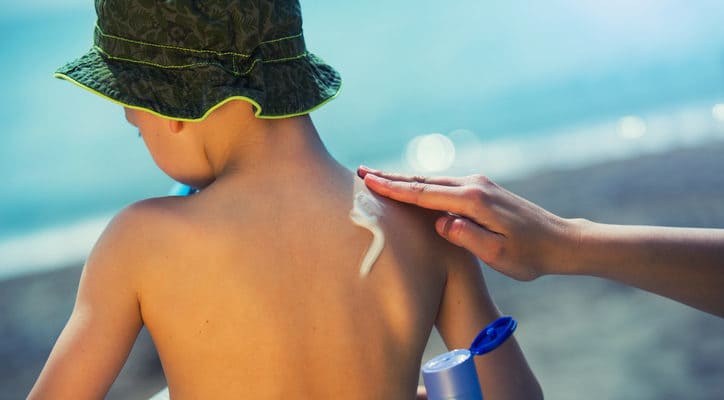Ways to determine an infants caloric needs

Learn how to determine your baby’s caloric needs, including the calories in breast milk and formula, to ensure your infant gets the right nutrition for healthy growth.

Not only adults but also children need to use sunscreen when going to the beach. With my child's fragile skin, which children's sunscreen must I choose?
aFamilyToday Health recommends choosing physical sunscreens that have zinc oxide or titanium dioxide ingredients instead of chemicals. Also, if the baby is under 6 months old, parents should avoid the sun whenever possible. If that doesn't work, protect your child with mild sunscreen.
Physical sunscreen (sunblock) contains ingredients titanium dioxide or zinc oxide acts as a "wall" to block the impact of UV rays on the baby's skin. Sunscreen contains 2 ingredients that will act as sun protection when applied to the skin.
On the other hand, chemical sunscreens, after being applied to your skin, have to wait 15 to 30 minutes before giving your skin time to absorb them. In many studies, experts found that chemical sunscreens contain many powerful chemicals in the ingredients, so it is easy to cause skin irritation in babies.
Currently, there is no evidence that chemical sunscreens are dangerous or harmful to baby's sensitive skin, but it is not possible to guarantee 100% of the ingredients in them are safe. So parents should be careful!
If you use a chemical sunscreen, first check for pressure allergies by applying a small layer to the skin on the inside of your arm to make sure it won't irritate your baby's skin. If your child has a rash or rash the next day, choose a different sunscreen.
Any sunscreen that contains zinc oxide or titanium dioxide has a broad spectrum sun protection that protects skin from UVA and UVB rays. When buying a sunscreen, choose one with a sun protection factor of at least 15 SPF. For children, this number does not need to exceed 30 SPF. The higher the SPF number, the more chemicals that affect your baby's skin.
There are plenty of sunscreens on the market for kids, but don't waste your effort finding one of these as they are usually no different from the adult version.
Apply a thin layer of sunscreen to make sure every part of your baby's body is well protected. Pay particular attention to areas prone to sun exposure such as ears, nose, neck, and shoulders. The sunscreen turns milky white when you apply it and then fades away in a few minutes, making it easier to see which part of the skin has been applied.
You should regularly apply sunscreen to your baby. Ads always show that waterproof sunscreens last longer than other products, but they'll need to apply extra sunscreen every 2 hours or every time they get wet or dry. with a towel.
You should note that new types of zinc oxide and titanium dioxide products are known as physical sunscreens. Several other sunscreens (whether chemical-based or have sunscreen ingredients) are listed as “physical sunscreens” on the label. So the best way to know which one you are using is to check the ingredients on the label.
Hopefully, through the article, parents will have a lot of useful information about sunscreen for children, especially can choose the best type to protect their baby's skin from the harsh summer sun .
Learn how to determine your baby’s caloric needs, including the calories in breast milk and formula, to ensure your infant gets the right nutrition for healthy growth.
Discover the top 5 smartest dog breeds in the world, including Border Collie, Poodle, German Shepherd, Golden Retriever, and Doberman Pinscher. Learn about their unique traits and why they are considered the most intelligent dogs.
Discover 7 nutritious and delicious ways to cook egg porridge for babies, including recipes with cheese, pumpkin, tomato, and more. Learn how to prepare baby-friendly egg porridge with our expert tips.
After a series of medical measures they obtained a complete human vascular system profile.
Watermelon is one of the fruits that many people love, not only cheap but also delicious, nutritious and refreshing in the summer. To get delicious watermelon pieces, show off your housewives, your artistic talents to cut beautiful pieces of watermelon.
aFamilyToday Health - The digestive system and body in each baby is different. Parents need to recognize notes to deal with when babies have a food allergy!
Babies need many factors for perfect development. aFamilyToday Health shares with parents things to keep in mind when babies are 8 weeks old so that parents can take care of their babies the best!
Babies need many factors for perfect development. aFamilyToday Health shares with parents things to keep in mind when babies are 18 weeks so that parents can take care of their babies the best!
Babies need many factors for perfect development. aFamilyToday Health shares with parents things to keep in mind when babies are 28 weeks old so that parents can take care of their babies the best!
Babies need many factors for perfect development. aFamilyToday Health shares with parents things to keep in mind when babies are 32 weeks old so that parents can take care of their babies the best!








